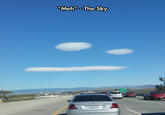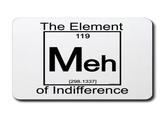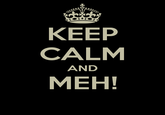Meh.
Part of a series on Internet Slang. [View Related Entries]

About
Meh is an interjection used to express feelings of ambivalence or indifference, though it is generally regarded as an indication of mild disapproval.
Origin
The word "meh" is believed to have entered online usage through newsgroups on Usenet, with the earliest known instance found on soc.motss in a discussion about the TV sitcom series Melrose Place posted by John Dorrance on July 9th, 1992:
Meh… far too Ken-doll for me…
One last bitch about the show: exactly how frequently can we expect to
see people being tossed into the pool for warm-comedic effect? I'm
gagging…
Later that same year, it was quoted in a scene from The Simpsons episode "Homer's Triple Bypass" that aired on December 17th, 1992, by Lisa while lamenting about her generation's utter lack of sympthy towards others' misfortunes. According to Wikipedia, there are two theories behind the etymology of "meh": the more credible explanation of the two credits the animated TV series The Simpsons as the origin of its colloquial usage, while another theory suggests it is rooted in Yiddish language because of its similarity to the interjection "feh," which made its earliest known appearance in the 1936 classic film Yidl Mitn Fidl as the transliteration of the sound a goat makes.
Spread
The expression made additional appearances in subsequent episodes of The Simpsons, perhaps most prominently in the the 2001 episode "Hungry, Hungry Homer" in which Lisa spells out the word for emphasis ("M – E – H") when Homer tries to convince Lisa and Bart into going to the amusement park "Blockoland."
The earliest known Urban Dictionary definition of the term was submitted by Harold Lauder on November 16th, 2002:
Indifference; to be used when one simply does not care.
In the following decade, more than 280 additional entries for "Meh" have been submitted to Urban Dictionary and it was eventually chosen as the Urban Word of the Day on May 22nd, 2007. The earliest known record of the term in print media can be attributed to an article titled "Ryan Opray got voted off Survivor. Meh" published by the Canadian newspaper The Edmonton Sun in 2003.
Inclusion in English Dictionary
In November 2008, the word was formally recognized as a word by Collins English Dictionary. The news of its admission was covered in the following days by numerous high profile publications, including SkyNews, BBC and New York Times among others.
The news of its admission even drew some controversy in the mainstream media, when The Daily Telegraph writer Sam Leith described its inclusion in an English dictionary as a "gimmick." Meanwhile, some Canadians reportedly took offense in the choice of example of conversational usage, which read "As in 'the Canadian election was so meh.'" In response to the objections, the senior editor for Collins dictionaries Cormac McKeown said:
"This is a new interjection from the US that seems to have inveigled its way into common speech over here."
Usage in Journalism
In December 2009, "Meh" was included in the list of 20 words which 'defined the decade' published by BBC News Online. There are a number of personal blogs referencing the word "meh"[9][10][11] and Memegenerator has a middle-range tier called "Meh." In 2011, it was also used as the title of several New York Times articles, including "Meh -- And I Mean That" published on September 22nd, 2011, and "The Meh List" published on December 14th, 2011.
Search Interest
External References
[1] Google Group – Yes, I actually watched Melrose View
[4] Waxy – John Hodgman on Meh
[6] New York Times – Meh and I Mean That
[8] The Register – 'Meh' makes Collins English Dictionary
[10] Generation Meh – Talk About Meh Generation
[11] Touch of Meh – Life with a Touch of Meh
[12] Meh Romney – MEH ROMNEY
[14] Sky News – Bothered Much? 'Meh' Is A Word

















Top Comments
Frenchi
Jul 12, 2012 at 12:58AM EDT
Rainbow Crash
Jul 12, 2012 at 08:00AM EDT